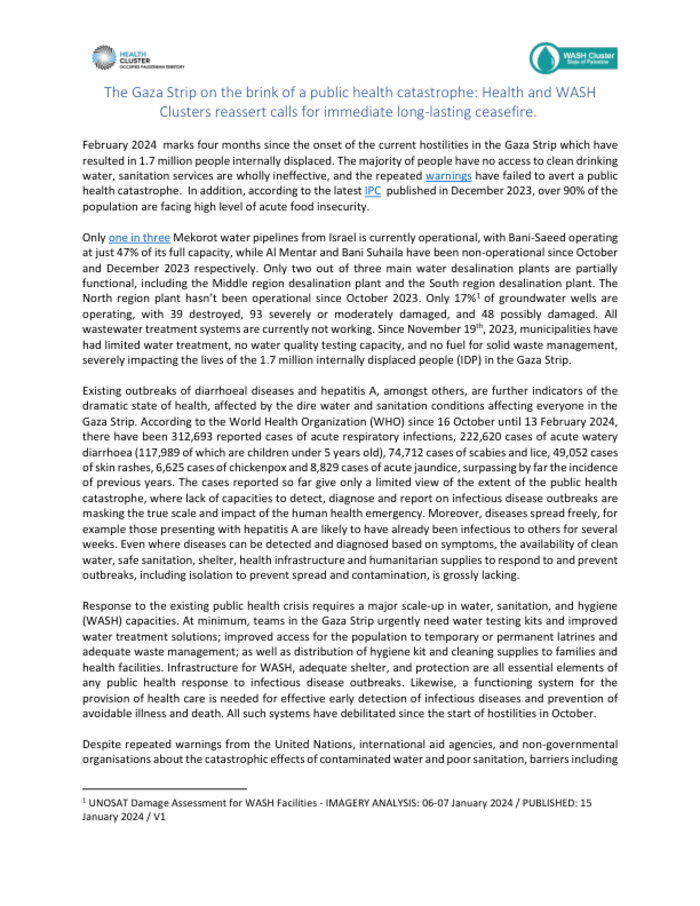February 2024 marks four months since the start of current hostilities in the Gaza Strip, where 1.7 million people have been internally displaced. The vast majority of people do not have access to clean drinking water, sanitation services are completely non-functional, and despite repeated warnings, a public health catastrophe has not been averted. Furthermore, according to the latest IPC published in December 2023, more than 90% of the population faces high levels of severe food insecurity.
Only one in three of Israel's Mekolot water pipelines is currently in operation, with Bani Said at just 47% of its total capacity, and Al-Mentar and Bani Suhaira respectively scheduled to open in October 2023. It has not been operational since December. Of the three major desalination plants, only two are partially functional, including the central region desalination plant and the southern region desalination plant. The power plant in the northern region has not been operational since October 2023. Only 17% of groundwater wells are operational, of which 39 have been destroyed, 93 have suffered severe or moderate damage, and 48 may have been damaged. Currently, all wastewater treatment systems are not functioning. Since November 19, 2023, local governments have had limited water treatment, no water testing capacity, and no fuel for solid waste management, making life difficult for 1.7 million internally displaced persons (IDPs) in the Gaza Strip. is having a serious impact.
In particular, existing outbreaks of diarrheal diseases and hepatitis A are affected by the deplorable water and sanitation conditions that affect everyone in the Gaza Strip, with health conditions deteriorating dramatically. This is a further indicator that According to the World Health Organization (WHO), from October 16 to February 13, 2024, there were 312,693 cases of acute respiratory infections and 222,620 cases of acute watery diarrhea (including 117,989 cases). children under 5 years of age), 74,712 cases of scabies were reported. There were 49,052 cases of lice, skin rashes, 6,625 cases of chickenpox, and 8,829 cases of acute jaundice, far higher than the previous year's rates. The cases reported so far provide only a limited picture of the scope of the public health disaster. Lack of capacity to detect, diagnose and report infectious disease outbreaks masks the true scale and impact of the human health emergency. Moreover, the disease spreads freely. For example, if you have hepatitis A, you may have been infecting others for several weeks. Even when diseases can be detected and diagnosed based on symptoms, access to clean water, safe sanitation, shelter, medical infrastructure, and humanitarian supplies to respond to and prevent outbreaks, including isolation to prevent spread and contamination, is essential. Availability is severely lacking.
Responding to the current public health crisis requires a significant expansion of water, sanitation, and hygiene (WASH) capacity. At the very least, teams in Gaza urgently need water testing kits and improved water treatment solutions. Improving public access to temporary and permanent toilets and proper waste management. We are also distributing hygiene kits and cleaning supplies to families and healthcare facilities. WASH infrastructure, adequate shelter, and protection are all essential components of the public health response to infectious disease outbreaks. Similarly, effective early detection of infectious diseases and prevention of avoidable illness and death require functioning systems for delivering health care. All these systems have been weakened since the fighting began in October.
Despite repeated warnings from the United Nations, international aid agencies, and non-governmental organizations about the devastating effects of contaminated water and poor sanitation, barriers such as movement restrictions, lack of safety, and import restrictions remain persistent, and the world's This is leading to serious issues in each country. Humane response. Access to water and sanitation is an internationally recognized human right, derived from the right to an adequate standard of living under article 11(1) of the International Covenant on Economic, Social and Cultural Rights. is fundamental to health, dignity and prosperity. all the people. Overall, these rights can only be realized with an immediate ceasefire and a significant increase in aid to the Gaza Strip.
Preventing the ongoing public health catastrophe from worsening requires urgent action involving multiple stakeholders and partners at all levels.
A call to action: Immediate steps are needed to prevent the worsening of the public health catastrophe already occurring in the Gaza Strip:
-
Immediate and lasting ceasefire. Critical to an effective health and flushing response is safe and unobstructed access to people in need, especially in northern Gaza, where access to water, sanitation, hospitals and health centers is nearly impossible. It is the cessation of hostilities that makes possible the cessation of hostilities. -Exists.
-
Safe and unhindered large-scale humanitarian access across and within the Gaza Strip, including in the north, to ensure an immediate and unhindered flow of non-food items needed for an effective health and WASH response. is guaranteed.
-
Ensure free and safe movement of medical and humanitarian workers in and into the Gaza Strip. Ensuring safe access, unimpeded communication, and proper coordination of activities is essential for an effective response. This includes the free and safe movement of his WASH technical staff for the operation and maintenance of critical water and sanitation facilities and services.
-
Please bring the Mekolot water pipeline to northern Gaza into full operation immediately. The pipeline is currently partially operational and has the potential to immediately improve access to safe drinking water. Allow safe access to repairs on the Bani-Suhaela-Mekorote line in the southern region and the Bani-Saeed line in the central region. This includes safe access for technical assessment and material supply for repair work.
-
Allow access to construction items related to temporary toilet/shower facilities for internally displaced persons.
-
Particularly in restricted areas such as northern Gaza, where fuel has been off-limits since the temporary ceasefire in November 2023, ensuring there is enough fuel to operate critical water and sanitation infrastructure, including desalination plants and wells. do.


